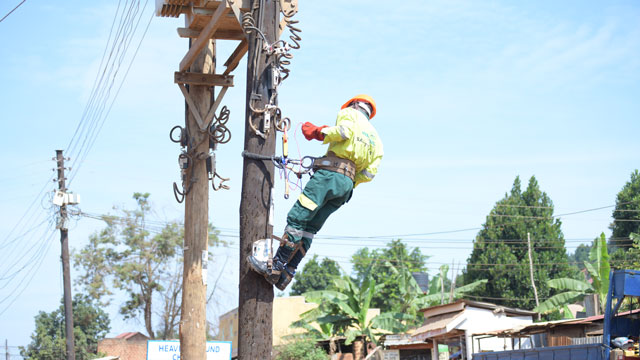
By Guest Writer
Opinion: Last week on Friday, I had the opportunity to visit Rushoroza village in Buhunga Sub County, Rukungiri district, where I spent three days. However, I was shocked that most of the villages in Buhunga Sub County, for example, Oruhita, Nyamabare, Nyamiyaga, Byarugambwa, Ekijonde, and others in Rukungiri district, have no access to electricity.
This is because the presence of the electric grid is particularly limited in rural areas, especially in the northern (30%) and western (35%).
This limits access to electricity, especially in rural areas, which hinders the national ambitions to transform Uganda from a low-income country to a middle-income one by 2040 because it reduces the growth of industries that provide employment and increases the country’s revenue base.
According to a World Bank study, more than 1.2 billion people in the world’s population have no access to electricity, and about 80% of those without access to modern energy live in rural areas.
Access to electricity is more essential for agricultural production and processing because it contributes to the promotion of a more commercialized agricultural sector in the developing world, yet particularly in rural sub-Saharan Africa, electrification rates are very low, with only about 18% of the rural population having access to electricity.
Such low electrification constrains both agricultural and productivity postharvest processing because many agriculture raw materials need to be processed within a few hours of harvesting to ensure food conservation and marketability.
Despite the significant efforts over the last 20 years, the rate of electricity has remained low. Although power is available in Uganda, especially hydrological and other renewable resources, many communities, homes, and businesses do not have access to electricity due to expensive grid connection fees, including high house wiring costs.
According to the International Energy Agency, as of 2019, Uganda ranked seventh among the top 20 access-deficit countries, with 26 million people lacking access to electricity.
It was reported that only 35% of the rural population in Uganda has access to electricity, while in urban areas this was 72% in 2021. The country’s energy sector is also said to be facing considerable challenges, including acute power shortages, increased demand, and a lack of new power-generation projects, which is so unfortunate.
It is noted that without access to reliable electricity, farmers are limited in their ability to adopt modern farming practices since they rely on electricity for a number of processes such as grinding, milling, drying, packaging, mechanization (threshing, milking), irrigation, and lighting to increase their productivity and their welfare.
Such operations offer farmers small opportunities to run their activities better and move beyond subsistence farming towards food security and subsequent expansion into agricultural markets.
Therefore, the government needs to look into electrifying rural areas since it is the base of most farmers to address the issue of food insecurity, and through this, the agricultural challenges are addressed, which benefit both the farmers and the country as well, because lack of power access is among the biggest challenges affecting food security and causing climate change in rural areas since most people depend on biomass energy, which is increasing pressure on natural resources, especially forests.
The high rates of deforestation in the world are partly attributable to charcoal burning and wood fuel, thus leading to climate change, which results in frequent prolonged periods of drought and erratic rainfall, hence leading to food insecurity.
With the availability of electricity in rural areas, farmers can buy hammer mills where the local people can have their maize processed into mile meal and help rural dwellers advance in farming through the use of proper irrigation such as pivoting irrigation for crop irrigation.
With no electricity, these works get delayed, thus spoiling everything for the farmers and the country as well because it limits the ability of small businesses and farmers to increase their productivity and income, which can lead to economic growth in the country.
The government also must ensure providing financial incentives such as subsidies and tax breaks to attract investments in the electricity sector, especially in underserved regions, in order to encourage private sector participation and stimulate economic growth in Uganda.
Given the country’s abundant natural resources, the government should prioritize the development and utilization of renewable energy sources such as solar, wind, and hydroelectric power to reduce reliance on fossil fuels, enhance energy security, and promote sustainable development.
Prioritizing the electrification of underserved areas such as remote villages, marginalized communities, and areas with high poverty rates and limited access to essential services is crucial, and this will help people, especially farmers, who rely on electricity for a number of processes.
Through initiatives such as renewable energy mini-grids, energy access financing mechanisms, public-private partnerships, and the adoption of innovative technologies, we can accelerate progress towards achieving universal energy access in our country, and this will improve people’s standards of living by allowing greater efficiency and productivity, thus generating additional revenue for both farmers and the country.
The author is Olive Atuhaire, Research Associate.
Disclaimer: As UG Reports Media LTD, we welcome any opinion from anyone if it’s constructive for the development of Uganda. All the expressions and opinions in this write-up are not those of UG Reports Media Ltd. but of the author of the article.
Would you like to share your opinion with us? Please send it to this email: theugreports@gmail.com.





